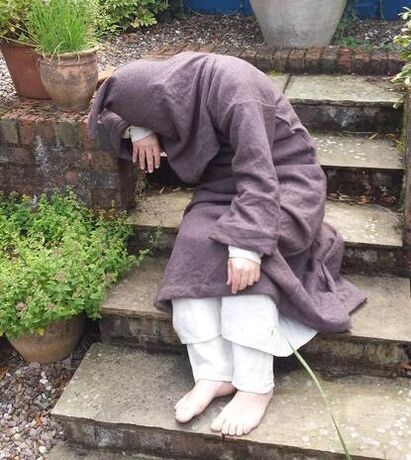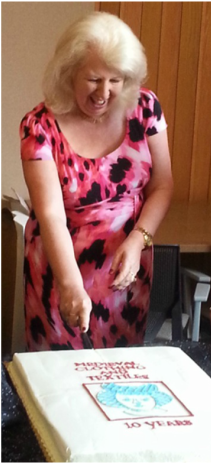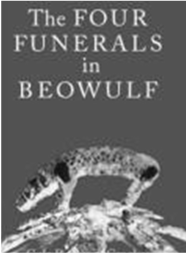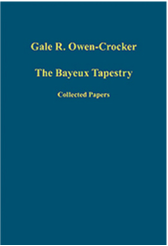I had the pleasure, this past Thursday evening, of attending Professor Gale Owen-Crocker’s retirement celebration. What a wonderful scholar! In the field of Anglo-Saxon studies she stands as one of the greats. She has pioneered the study of Anglo-Saxon dress, has used her weighty interdisciplinary skills to open up new ways of reading our most famous poem Beowulf, and has compelled us to look ever closer at the Bayeux Tapestry. It’s certainly not difficult to enumerate her academic achievements, though you would need to utilise a medieval monk’s mnemonic techniques in order to recall her huge list of publications! What we don’t always get to hear, though, about someone who has been as successful as Gale, are the personal accounts of kindness, humility and sense of fun. 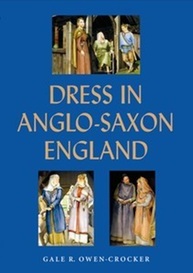 Gale's 1986 Dress in Anglo-Saxon England was a milestone in medieval studies. The revised and enlarged edition of 2004 is now available in paperback. Please click on the image to take you to Boydell's page for the book. Gale's 1986 Dress in Anglo-Saxon England was a milestone in medieval studies. The revised and enlarged edition of 2004 is now available in paperback. Please click on the image to take you to Boydell's page for the book. I am always proud to say that I was one of Gale's students at the University of Manchester. She taught me right through my undergraduate and Masters degrees, and then was kind enough to agree to supervise my doctoral studies. Which brings me to my first bit of reminiscing: You see, when applying to carry out research for a PhD, you do need to get someone onside, to convince them of the validity of what you’re about to attempt. Gale was always very approachable and welcoming, but she was also refreshingly honest: “I’m really not sure, Chris, that you will find enough material to do a PhD.” That material was, of course, stuff to do with sex. I wanted to spend four years looking at sexual discourse in early medieval England at a time when, within the sometimes conservative world of Anglo-Saxon studies, it would have been easy to believe that the Anglo-Saxons didn’t actually have sex! To Gale’s great credit – and to my relief – she agreed to supervise me, and before long we were having many a constructive supervisory session talking about, amongst other things, concubinage, sex in monasteries, and Anglo-Saxon aphrodisiacs. With this amazing professor, you see, it didn’t matter if you were exploring garnet cloisonné inlay, poetic metre, or, indeed, the definition of inter-femoral intercourse, she always offered her enthusiastic support. And I really did always feel supported by Gale, right through what ended up being six years of on-and-off doctoral study. You know, there are always tales of nightmare academic supervisors, and the journey through a PhD can be, at times, like one through the longest of tunnels without the pin of light at the end. I was very ill a couple of times during my PhD, and what I remember most about Gale at those times is the way she, without any fuss, eased me back into my work. She knew I wasn’t up to much the second time I ventured to return to my research – let’s just say my cognitive function was a little addled – but she didn’t panic, and I didn’t panic. She quietly encouraged me to go at my own pace, and gave me the freedom to search for and retrieve my academic skills. And, in time, with Gale’s gentle approach, I felt like I was flying again. My final bit of reminiscing relates to a chat with Gale whilst walking across the campus one day. It was at a moment in my PhD studies when I was having a few doubts. You may know that Impostor Syndrome always runs freely around any university, and its most obvious symptom is staring into mirrors. Well, I was saying to Gale that I didn’t quite fit into the academic mould, that some of the theoretical material I was reading was verging on impenetrable. I really didn’t feel that I was capable of mastering or reproducing that kind of ‘elevated’ scholarship. Gale just simply said, Well, you know that we need the accessible stuff, too. That made me feel so much better, and continues to motivate me to this day. And when I think about it all, accessibility is really the most appropriate way for me to sum up Professor Owen-Crocker. Her scholarship is, without doubt, of the highest order, but it is also accessible. She makes it count. And, then, she herself is accessible. I can always recognize her across the crowded refectory at the International Congress on Medieval Studies at Kalamazoo, Michigan, not simply by her glorious white-blonde hair, which makes me think of Queen Wealhtheow in Beowulf, but by her warm smile as she looks up and catches my eye.
6 Comments
Gale Owen-Crocker
21/2/2015 09:52:16 am
I am most touched by this reminiscence. I would add that you were the most wonderful undergraduate and postgraduate student a teacher could have. Your organization of a 'gift-giving' for Yule in the year we were doing Beowulf was memorable and your performance in the Bayeux Tapestry play last Thursday will never be forgotten by anyone who saw it..
Reply
Chris *The Anglo-Saxon Monk
22/2/2015 04:40:20 am
Maybe there's a thespian trying to get out! It was great fun doing the Bayeux Tapestry play, especially my Allo! Allo! version of Guy of Pontieu. It will be good to take it to Kalamazoo and I'm looking forward to your part in it!
Reply
Kate Ash
26/2/2015 07:01:21 am
What a lovely post. Chris. I did not know that Gail had retired. A wonderful person and such a supportive tutor. I was very lucky to have been taught by her on my master's degree at Manchester.
Reply
Chris * The Anglo-Saxon Monk
27/2/2015 12:11:19 am
Thanks, Kate. Couldn't agree with you more. She'll be sorely missed at Manchester. Didn't know you didn't know :-)
Reply
Carol Westley
27/2/2015 09:41:59 am
Gale has the unique ability - for those of us lucky enough to have been taught by her - to ground students in the practical know-how of Academic work while gifting them with the encouragement to spread wings and fly - our moment in the halls of Uni is as fleeting as the sparrow in the Mead Hall- but Gale ensures it is a golden one - thanks, Gale for the lasting inspirations of your teaching research and publications
Reply
Chris *The Anglo-Saxon Monk
27/2/2015 12:09:05 pm
That's lovely, Carol. And very apt.
Reply
Your comment will be posted after it is approved.
Leave a Reply. |
Details
|

